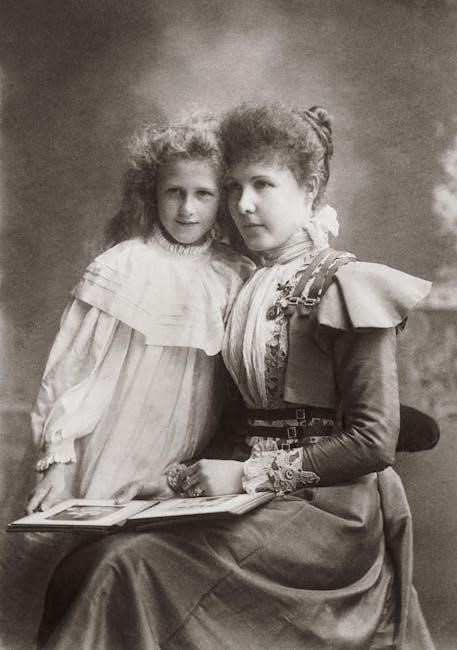the hawthorne legacy filetype:pdf

The Hawthorne Legacy explores the intricate blend of family secrets, power dynamics, and psychological insights, weaving a narrative that transcends generations and redefines identity.
1.1 Overview of the Hawthorne Legacy
The Hawthorne Legacy intertwines psychological insights, family dynamics, and power struggles, offering a captivating exploration of identity and inheritance. As the sequel to The Inheritance Games, it delves into Avery Grambs’ journey to uncover the truth about Tobias Hawthorne’s enigmatic past and her own connection to the family. The legacy reveals a complex web of secrets, societal influence, and enduring impact.
1.2 Historical Context and Relevance
The Hawthorne Legacy draws from the historical roots of the Hawthorne studies, which revolutionized management theory by emphasizing human relations and social dynamics in workplaces. Originating in the 1920s, these studies highlighted the importance of employee motivation and interpersonal connections, shaping modern organizational practices. The legacy underscores the enduring relevance of these insights in understanding workplace behavior and cultural dynamics today.
The Hawthorne Studies and Their Impact
Conducted at Western Electric, the Hawthorne Studies revealed the significance of social dynamics and human relations in workplace productivity, reshaping management practices and organizational theory.
2.1 The Origins of the Hawthorne Experiments
The Hawthorne Experiments began in 1924 at Western Electric’s Hawthorne Works, led by F.J. Roethlisberger and W.J. Dickson. Initially aiming to study workplace conditions and productivity, the studies expanded to explore social dynamics and human relations, laying the groundwork for modern management theory and organizational behavior research.
2.2 Key Findings and Their Influence on Management Theory
The Hawthorne Studies revealed that social interactions and employee morale significantly impacted productivity, challenging the earlier focus on technical factors. These findings influenced the development of human relations management, emphasizing the importance of workplace culture, communication, and employee satisfaction, thus reshaping modern management practices and organizational behavior theories globally.
The Hawthorne Legacy in Modern Management
The Hawthorne Legacy emphasizes human relations, influencing modern management by prioritizing employee morale, social dynamics, and workplace culture to enhance productivity and organizational success.
3.1 Application of Hawthorne Principles in Contemporary Workplaces
The Hawthorne studies’ emphasis on human relations and social dynamics has shaped modern workplace practices, focusing on employee morale, communication, and leadership. Contemporary organizations apply these principles to foster collaboration, recognize individual contributions, and create supportive environments, enhancing productivity and job satisfaction while addressing the evolving needs of a diverse and interconnected workforce.
3.2 Criticisms and Reassessments of the Hawthorne Studies
Despite their influence, the Hawthorne studies have faced criticism for methodological flaws and overgeneralized conclusions. Scholars argue that the findings lack empirical rigor and may reflect biases of the researchers. Recent reassessments highlight the need for a more nuanced understanding, emphasizing the studies’ historical context and the limitations of their application to modern organizational dynamics and human relations theories;

The Hawthorne Family and Their Influence
The Hawthorne family’s enigmatic legacy is marked by power, secrets, and intricate dynamics, with Tobias Hawthorne at the center, shaping destinies and uncovering hidden truths through his mysterious grandsons.
4.1 Tobias Hawthorne: The Enigmatic Figure
Tobias Hawthorne, a billionaire with a penchant for mystery, left an indelible mark through his intricate games and puzzles. His unexpected decision to leave his fortune to Avery Grambs, a stranger, sparked a chain of events that unraveled family secrets and tested alliances. His influence extends beyond wealth, shaping identities and loyalties through his enigmatic legacy.
4.2 The Role of the Hawthorne Family in Shaping Legacy
The Hawthorne family’s history is marked by power, mystery, and intricate relationships. Through generations, they have influenced each other’s destinies, with Tobias Hawthorne’s enigmatic actions setting the stage for a legacy of secrets and revelations. The family’s dynamics continue to shape their identities, as seen in Avery Grambs’ journey to uncover truths hidden within the Hawthorne estate and its storied past.
The Inheritance Games and The Hawthorne Legacy
The Inheritance Games and The Hawthorne Legacy intertwine through Avery Grambs’ journey, unraveling puzzles and secrets left by Tobias Hawthorne, reshaping her identity and fortune.
5.1 Plot Summary and Character Development
Avery Grambs navigates a labyrinth of secrets and riddles left by Tobias Hawthorne, uncovering hidden truths about her father’s identity and her mother’s past. As she bonds with her siblings and faces rivalry with the enigmatic Hawthorne grandsons, Avery’s journey reveals her resilience and determination to claim her inheritance, redefining her sense of identity and purpose.
5.2 Themes of Inheritance, Identity, and Power
The Hawthorne Legacy delves into themes of inheritance as a double-edged sword, exploring the weight of family legacies and the struggle for identity. Power dynamics unfold through the Hawthorne family’s enigmatic influence, while Avery’s journey reflects the tension between self-discovery and the burdens of inherited responsibility, revealing how power shapes relationships and destinies in unexpected ways.
Social and Cultural Implications of The Hawthorne Legacy
The Hawthorne Legacy reflects societal values, challenging class structures and power dynamics while exploring identity. Its cultural significance lies in its portrayal of human behavior and relational complexities.
6.1 The Role of Social Dynamics in the Hawthorne Studies
The Hawthorne Studies highlighted how social interactions significantly influence productivity and task performance. Researchers observed that employee morale and collaboration were crucial factors, often outweighing physical conditions. This revelation shifted management focus from technical aspects to human relations, emphasizing the importance of a positive work environment and interpersonal connections in achieving organizational success.
6.2 Cultural Significance of the Hawthorne Family’s Story
The Hawthorne family’s story holds profound cultural significance, reflecting themes of power, identity, and legacy. Tobias Hawthorne’s enigmatic persona and the mysterious inheritance games captivate audiences, symbolizing the complexities of privilege and responsibility. Their narrative bridges generations, offering insights into human behavior and societal dynamics, making the Hawthorne legacy a timeless and thought-provoking cultural phenomenon.

The Hawthorne Legacy in Literature and Media

The Hawthorne Legacy, a sequel to The Inheritance Games, captivates readers with its intricate plot and cultural impact, making it a standout in modern young adult literature and media discussions.
7.1 The Novel as a Sequel to The Inheritance Games
The Hawthorne Legacy seamlessly continues Avery Grambs’s journey, unraveling mysteries left by Tobias Hawthorne. As Avery navigates her inheritance and family secrets, the novel deepens her character development and introduces new challenges. The sequel explores themes of identity, power, and legacy, while maintaining the suspense and intrigue that made The Inheritance Games a hit. It captivates readers with its intricate plot and emotional depth.
7.2 Adaptations and Interpretations in Popular Culture
The Hawthorne Legacy has inspired various interpretations, from discussions in literary circles to potential screen adaptations. Its intricate plot and deep themes make it a compelling candidate for film or TV series. Additionally, the novel’s focus on family dynamics and power struggles resonates in popular culture, sparking debates about inheritance and identity. Its influence extends beyond literature, shaping modern storytelling trends.

The Hawthorne Legacy and Psychology
The Hawthorne studies provided psychological insights into workplace dynamics, emphasizing human relations and employee motivation, which significantly influenced management theories and remain relevant in modern organizational psychology.
8.1 Psychological Insights from the Hawthorne Studies
The Hawthorne studies revealed psychological principles such as the impact of social interactions on productivity and the importance of employee recognition. These findings demonstrated that workplace morale and employee satisfaction significantly influence performance, challenging traditional views of management and laying the groundwork for modern psychological approaches in organizational behavior and human relations.
8.2 The Role of Human Relations in the Hawthorne Legacy
The Hawthorne studies highlighted the importance of human relations in workplace dynamics, emphasizing communication, trust, and employee satisfaction. This legacy revolutionized management by shifting focus from physical conditions to interpersonal interactions, demonstrating that fostering positive relationships and addressing emotional needs significantly enhances productivity and organizational harmony.

The Hawthorne Legacy and Business Practices
The Hawthorne Legacy influenced business practices by emphasizing human relations, workplace dynamics, and employee well-being, reshaping management strategies to prioritize psychological and social factors alongside productivity.
9.1 The Impact of the Hawthorne Studies on Business Management
The Hawthorne Studies revolutionized business management by highlighting the importance of social dynamics and human relations in the workplace. They demonstrated that employee productivity is influenced by factors beyond physical conditions, such as recognition, interaction, and emotional well-being. This led to a shift in management practices, emphasizing communication, teamwork, and psychological support. The studies laid the foundation for modern management theories focused on employee satisfaction and organizational culture.
- Introduced the concept of the “Hawthorne Effect,” where attention alone could boost productivity.
- Influenced the development of human relations management and workplace psychology.
- Encouraged businesses to adopt more empathetic and inclusive leadership styles.
9.2 Modern Applications of Hawthorne Principles
The Hawthorne Principles continue to influence modern business practices by emphasizing the importance of human relations and social dynamics. Today, companies apply these principles through employee engagement strategies, open communication, and fostering a positive workplace culture. Techniques such as regular feedback, team-building activities, and flexible work environments reflect the enduring relevance of the Hawthorne Studies in enhancing productivity and employee satisfaction.
The Hawthorne Legacy and Historical Preservation
The Hawthorne Legacy emphasizes preserving historical significance through educational initiatives and cultural programs, ensuring the enduring impact of the Hawthorne family’s contributions remains accessible for future generations.
10.1 The Importance of Preserving the Hawthorne Legacy
Preserving the Hawthorne Legacy is crucial for maintaining historical integrity and cultural significance. The legacy offers insights into societal dynamics, psychological influences, and management theories. By safeguarding this heritage, future generations can learn from its contributions to literature, psychology, and business practices, ensuring its relevance and application remain vibrant and accessible over time.
10.2 Efforts to Maintain the Hawthorne Family’s Historical Significance
Efforts to maintain the Hawthorne family’s historical significance include academic research, archival preservation, and community initiatives. Scholars and institutions work to document their impact on literature, psychology, and business. Educational programs and public events also highlight their contributions, ensuring the Hawthorne legacy remains accessible and relevant for future generations to study and appreciate.

The Hawthorne Legacy in Education and Research
The Hawthorne Legacy has significantly influenced education and research, integrating its psychological and management insights into academic curricula and fostering interdisciplinary studies.
11.1 The Role of the Hawthorne Studies in Academic Research
The Hawthorne Studies are pivotal in academic research, offering foundational insights into human behavior and workplace dynamics. They have shaped numerous theories in psychology, sociology, and management, influencing methodologies and frameworks that continue to guide contemporary studies and scholarly inquiries across various disciplines.
11.2 The Hawthorne Legacy as a Teaching Tool
The Hawthorne Legacy serves as a dynamic teaching tool, enabling educators to explore themes like identity, power, and family dynamics. Its narrative richness fosters critical thinking and engagement, making it ideal for literature and social studies curricula. The book’s intricate puzzles and character development encourage interactive learning, helping students analyze complex human interactions and societal influences.
The Hawthorne Legacy’s enduring relevance lies in its timeless insights into human dynamics and power structures, offering a foundation for future explorations in psychology, literature, and management.
12.1 The Enduring Relevance of the Hawthorne Legacy
The Hawthorne Legacy remains a cornerstone in understanding human behavior and organizational dynamics, offering insights that continue to resonate across various fields, from psychology to business management, ensuring its lasting impact and relevance in modern contexts.
12.2 Future Directions for the Hawthorne Legacy
The Hawthorne Legacy is poised to evolve through interdisciplinary research, integrating modern psychological and organizational theories. Emerging technologies, such as AI and big data, will enhance its applications in understanding human behavior and workplace dynamics, ensuring its continued relevance in addressing future challenges and fostering innovation across industries.